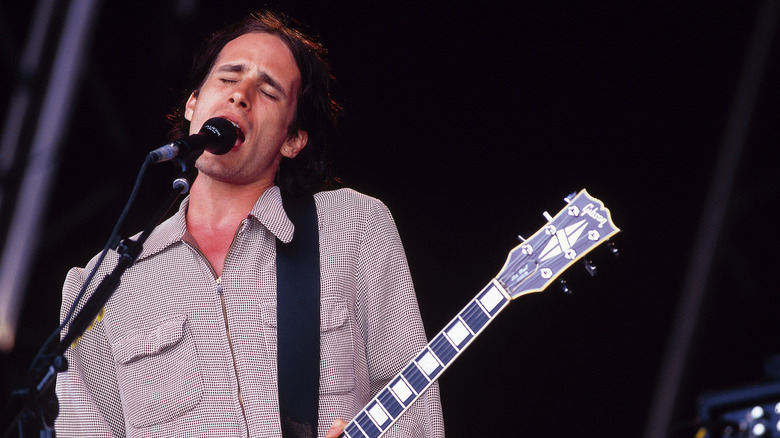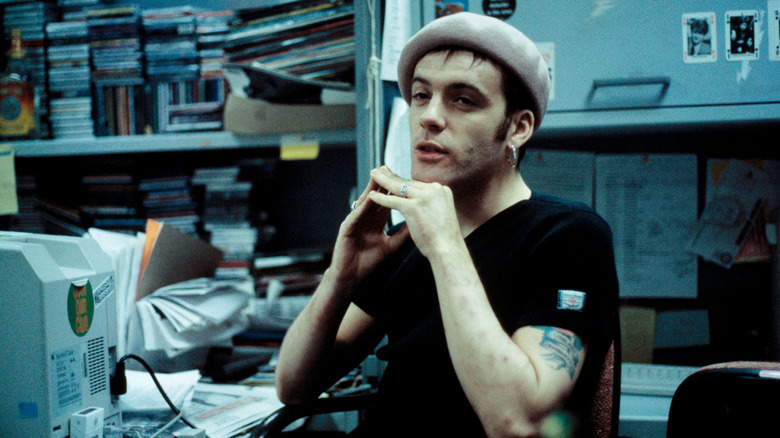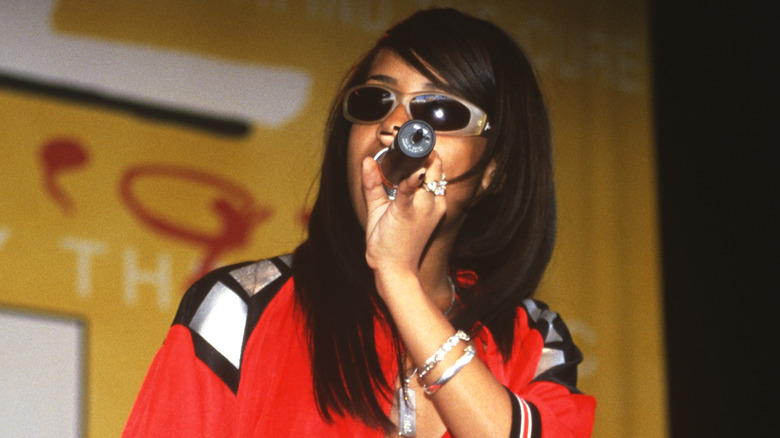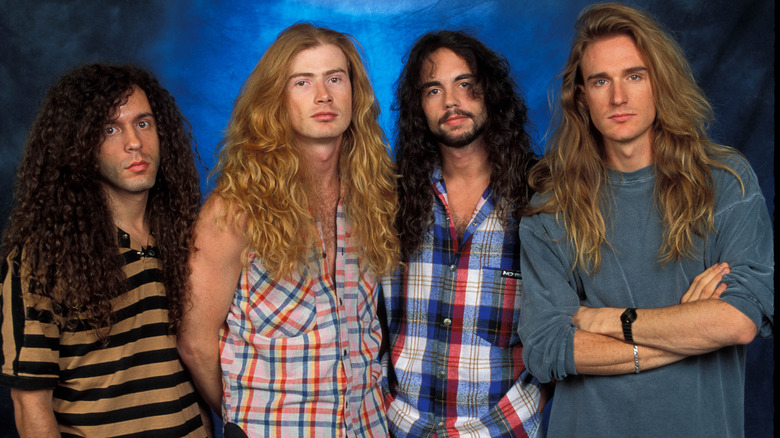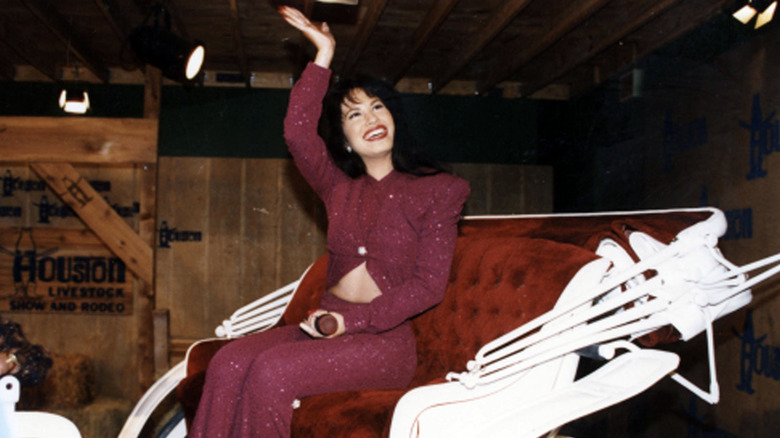'90s Musicians Who Died In Bizarre Ways
The '90s was a heck of a time for music. Rock, pop, hip-hop, R&B — there was something for everyone throughout the decade. The musicians behind the soundtrack to '90s lives possessed raw charisma, unwavering determination, and, of course, musical talent that produced some of the most iconic songs in existence. It can be tough to believe that these artists, no matter how much we love them, are human just like the rest of us. Make no mistake, though — they are, in fact, actual people, and they experience life's highest highs and lowest lows. They just tend to use it as inspiration.
As much as we'd love these musicians to live forever, the music has to stop at some point. For some, it stops in a peaceful instance. For others, though, it all ends in truly bizarre and unfathomable ways. From the rock stars who died tragically to the musicians who died before their music became popular, check out these '90s musicians who died in bizarre ways.
Dimebag Darrell Abbott
Hair metal was all the rage in the '80s, but heavy metal bulldozed the big hair and tight pants to usher in a new rock era in the '90s. The band that reigned supreme in the decade's heavy metal scene was Pantera, whose album "Cowboys from Hell" skyrocketed them to stardom in 1990. A key part of their sound came from guitarist "Dimebag" Darrell Abbott, whose heavy riffs and seamless weaving of rhythmic and melodic elements made him one of (if not the) best metal guitarists in a generation. He helped define Pantera's sound and influenced other rockers, including Ozzy Osbourne's guitarist Zakk Wylde and Metallica's James Hetfield. He was beloved and respected by fans and peers — and his senseless death was a huge gut punch to the rock world.
Abbott was playing a show at the Alrosa Villa nightclub in Columbus, Ohio, with Damageplan, his post-Pantera band with brother Vinnie Paul, when he was shot and killed on stage on December 8, 2004, at age 38. Three others were also killed in the attack. The man behind the tragic murder of Dimebag Darrell was Nathan Gale, a former Marine who was shot and killed by a police officer following his rampage. While we'll never know what exactly drove Gale to kill that night, his mother and friends reported that he had mental health issues and was "obsessed" with Pantera, even believing that the band ripped off lyrics he wrote and was trying to steal his identity.
Charlie Colin
Pop-alt rock band Train started gracing our ears with catchy hooks and feel-good melodies in the late '90s and early 2000s. Their 1998 single "Meet Virginia" introduced us to the talented quartet from San Francisco, but their legacy as pop-rock greats was cemented when 2001's Grammy-nominated "Drops of Jupiter" hit the airwaves and shot up to No. 5 on the Billboard Hot 100 chart. One of the talented musicians responsible for those early mainstream hits was founding member and bassist Charlie Colin. Colin was with the group from 1994 until 2003, when he left the band amid substance misuse issues. Colin stayed busy in the music scene after his Train days, playing with groups like Food Pill, Plainbirds (which original Train guitarist Rob Hotchkiss was also part of), and The Side Deal.
Colin was living in Belgium by the spring of 2024 and wasn't only making music, but teaching it. He was watching his friend's house in Brussels in May when he died at age 58 after slipping and falling in the shower. Train posted a touching tribute to Colin, one of the musicians who died in 2024 in truly bizarre fashion, on Instagram, gushing about his sweet nature and talent on the bass.
Jeff Buckley
Jeff Buckley is one of those once-in-a-generation musicians who left us way too soon — and we'll always wonder what could have been. After making a name for himself in the Big Apple's club and cafe scenes in the early '90s, Buckley released his debut (and only) album, "Grace," in 1994. The album features several etheric gems, including his hauntingly gorgeous and intimate rendition of Leonard Cohen's "Hallelujah." The tune displayed his raw talent and ability to draw in listeners while staying true to his angelic sound. Others took note of Buckley's talent with this cover; Rolling Stone added it to its list of the top 500 songs of all time back in 2004. "Grace" proved that Buckley was on his way to becoming a music staple of the decade and beyond — until a bizarre decision to take a late-night swim in the Mississippi River changed his fate forever.
On May 29, 1997, Buckley took an impromptu dip in the river while waiting for his band to land in Memphis, Tennessee, to record music for his second album. Buckley was swept up in the water after a boat passed by, and his body was spotted six days later in the water near Beale Street in Memphis. The tragic death of Jeff Buckley, who was only 30 at the time, was ruled an accident, leaving a generation forever longing to hear his authentic and heavenly vocals in a local coffee shop or intimate live venue.
Charmayne Maxee Maxwell
R&B was a massive genre in the '90s, with groups like Boyz II Men and En Vogue shaping the decade's unique sound and influencing its culture. A group that was thick in the '90s R&B boom was Brownstone, a soulful trio who were signed to Michael Jackson's record label. The group, consisting of Monica "Mimi" Doby, Nicole "Nicci" Gilbert, and Charmayne "Maxee" Maxwell (center), scored a huge hit with 1994's "If You Love Me." The tune hit the top 10 on the Billboard Hot 100 chart and earned the group a Grammy nomination. Not bad for a single from their debut album, right?
Maxwell's powerful vocals amplified the trio's soulful sound until the late '90s. More than 15 years later, a bizarre freak accident unexpectedly took her life. According to the Los Angeles Times, Maxwell died on February 28, 2015, after falling and cutting her throat on a broken drinking glass. She was just 46 at the time of her death.
Richey Edwards
Buckle up, kids — this is one of the biggest mysteries in classic rock still unsolved today. Richey Edwards was the lyricist and rhythm guitarist of the Manic Street Preachers, a Welsh band that was raw and rebellious in all its post-punk glory. Edwards was the band's mysterious, brilliant, and deeply complicated frontman. He struggled with his mental health, alcohol abuse, and self-harm, having notoriously cut the phrase "4 REAL" into his arm at one point.
On February 1, 1995, Edwards left his hotel in London and seemingly vanished off the face of the planet. His family declared him legally dead in 2008 and what happened to him remains a mystery to this day, although a few theories have emerged in the nearly 30 years since his disappearance. Some people think he died by suicide, given the status of his mental health and the fact that his abandoned car was found near a bridge where people had previously taken their lives. Others believe he disappeared on his own accord, with people reportedly spotting him in different locations well after 1995. Edwards' sister, Rachel, told GQ in 2020 that she's still looking for answers in her brother's disappearance.
Aaliyah
Aaliyah was that girl of the '90s R&B and hip-hop scenes. She scored a record deal at the tender age of 12 and, in 1994, released the game-changing album "Age Ain't Nothing But a Number" at only 15 years old. She scored hit after hit in the mid- and late-'90s, including the Grammy-nominated song "Are You That Somebody?" and the crossover hit "One in a Million." Ever the talented artist, she made her way to the silver screen, playing Trish O'Day in the action-packed movie "Romeo Must Die" opposite Jet Li, and Akasha, the unforgiving queen of the undead, in the sultry vampire fantasy-horror flick "Queen of the Damned."
By August 2001, Baby Girl had cemented herself as a staple in the R&B world and Hollywood, but her career was still on the rise. That month, she headed to the Bahamas to film the music video for "Rock the Boat" and boarded a plane to return home on August 25. In a bizarre and devastating turn of events, the overloaded plane crashed shortly after takeoff, killing Aaliyah and eight other passengers. She was only 22 at the time of her death. While she's one of the stars who tragically died before 30, there's no doubt she made an incredible impact on the '90s music scene and beyond, with artists like Rihanna and Ciara citing her as an influence on their work.
Nick Menza
Megadeth is one of the core thrash metal bands of the '80s and '90s that defined the genre and ushered it to the masses in brutal fashion. Founded by ex-Metallica guitarist Dave Mustaine, Megadeth combined their aggressive-yet-melodic sound with pointed social and political lyrics to create some head-turning (and headbanging) music. Nick Menza (pictured above with the band, second from right) laid the incredible rhythm foundation for some of Megadeth's biggest albums, including 1990's "Rust in Peace" and 1992's "Countdown to Extinction." Menza's dynamic, precise, and groovy style set him apart in the '90s metal scene, and he continued to rock with Megadeth until 1998 when he left the band to have knee surgery. Ever the dedicated musician, Menza continued to play music until he literally dropped dead on stage.
Menza is on the list of performers who died in front of their audiences, passing away on May 21, 2016, at age 51. He had a heart attack while performing at the Baked Potato in Los Angeles with OHM, his band with former Megadeth guitarist Chris Poland.
Troy Gentry
Troy Gentry was half of the country crooning act Montgomery Gentry, a duo who rose to fame in the late '90s and aughts with their outlaw twang and steadfast Southern rock roots. Gentry and his cowboy pal Eddie Montgomery scored big with chart-topping songs like "If You Ever Stop Loving Me" and "Roll with Me" and became one of the most successful two-piece country acts. Their success didn't seem like it could be stopped — until one fateful flight that made Gentry a country star who died tragically.
Gentry was on a helicopter tour of Medford, New Jersey, on September 8, 2017, right before a show Montgomery Gentry was set to play in the Flying W Airport & Resort. The helicopter crashed in the woods next to the airport, killing both Gentry and the pilot. Gentry was 50 years old. According to NBC, a report from the National Transportation Safety Board cited pilot error as the source of the fatal crash, stating that the pilot "cut the engine too soon as he tried an emergency landing," causing the helicopter to frantically descend.
Selena Quintanilla Pérez
Selena Quintanilla Pérez, commonly known as Selena, was a Mexican-American singer who rose to fame in the '90s after fronting her family's band since childhood. Dubbed the "Queen of Tejano," Selena was a Latin music powerhouse who blended its traditional sound with modern pop to create a sound all her own. Charismatic, talented, and passionate about her craft, she helped bring Tejano music into the mainstream and was truly adored by her fans.
By March 1995, Selena was in the prime of her career. She earned a slew of Billboard Latin Music Awards, snagged a Grammy for Best Mexican-American Album for her 1993 album "Live," and released her smash-hit fourth studio album "Amor Prohibido" in 1994. Her red-hot career was continuing upward — until she was bizarrely gunned down by someone she once trusted.
Yolanda Saldivar was the president of Selena's fan club and eventually managed one of the singer's boutiques in San Antonio. Things went sour, though, when Selena and her family suspected Saldivar of embezzling money from the shops and the fan club. Selena agreed to meet Saldivar at a Days Inn in Corpus Christi, Texas, on March 31, 1995, to get financial documents that Saldivar still had. During their confrontation, Saldivar shot Selena in the back of the shoulder, damaging an artery. The beloved singer ran to the lobby for help and identified Saldivar as the shooter before falling to the ground. She later died from her injuries at just 23 years old.
Saldivar was convicted of Selena's murder and sentenced to life in prison; she's eligible for parole in March 2025.
Chi Cheng
Heavy metal was all the rage in the early- and mid-'90s, but nu metal was sweeping the globe by the late half of the decade. One of the core bands of that era was Deftones, a nu metal-alternative group whose heavy metal roots and experimental vibe made their sound unlike any other. Hits like "Be Quiet and Drive (Far Away)" and "Change (In the House of Flies)" made them staples in the late '90s and 2000s rock music scene, and Chi Cheng, who played bass, helped define the band's rhythm and groove. Cheng was with Deftones until a terrible car crash ended his career in 2008.
Cheng's sister was driving them both when they crashed into another car in Santa Clara, California, in November 2008. Cheng was ejected from the vehicle after it rolled several times and sustained serious injuries that left him in a coma for several months. In 2009, he entered a semi-conscious state and, over the next few years, started to show signs of improvement but was still not able to move or speak.
Cheng's friends, family, and fans hoped the bassist would pull through and continue to improve, but his health took a turn for the worse in April 2013. He was taken to a Sacramento hospital on April 14, where he succumbed to cardiac arrest at age 42.
Lisa Left Eye Lopes
The '90s were the golden era for R&B, with one girl group ruling them all during this era: TLC. TLC combined R&B, hip-hop, soul, and pop to achieve massive crossover success with their game-changing albums "CrazySexyCool" and "FanMail." The group was made of Tionne "T-Boz" Watkins, Rozonda "Chilli" Thomas, and Lisa "Left Eye" Lopes. Lopes sang with her bandmates but is primarily known for rapping on TLC's music, like the iconic verse at the end of their smash hit "Waterfalls."
The trio, as well as Lopes herself, went through a lot during their time as a group, and tensions were felt in the late '90s and early 2000s that contributed to the tragic real-life story of TLC. Seeking personal and spiritual reconnection, Lopes went on a retreat to Honduras in 2002. She was also filming a documentary about Honduras at the time.
On April 25, 2002, Lopes was driving in Honduras when she lost control of the vehicle and crashed. All of the passengers survived, but Lopes died from her injuries at just 30 years old. What's bizarre about her death was that the moments leading up to the crash were caught on camera, as a producer for the documentary was riding in the car and had the cameras rolling. Some of that footage was used at the end of the 2007 documentary called "Last Days of Left Eye."
If you or anyone you know needs help with addiction issues or mental health or is struggling or in crisis, contact the relevant resources below:
- Visit the Substance Abuse and Mental Health Services Administration website or contact SAMHSA's National Helpline at 1-800-662-HELP (4357).
- Contact the Crisis Text Line by texting HOME to 741741, call the National Alliance on Mental Illness helpline at 1-800-950-NAMI (6264), or visit the National Institute of Mental Health website.
- Call or text 988 or chat 988lifeline.org
